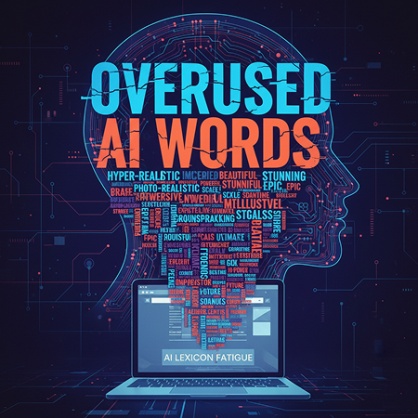List of Words Overused by AI: 140+ Common ChatGPT Phrases to Avoid
Have you ever read text online that sounds too polished? It uses big words that feel forced, and you suspect it's AI-generated. With tools like ChatGPT now common in content creation, AI often repeats certain words, making writing feel less human.
In this post, we'll share a list of words overused by AI . We'll also cover related ideas like the most overused words by AI, common ChatGPT words to avoid, and phrases AI leans on too much. Our goal is to help you spot these and make your writing feel more like you.
Catalogs:
Why AI Models Overuse Certain Words

AI models learn from millions of text examples. Much of this training data comes from formal sources like news articles, academic papers, and professional websites. This creates a bias toward formal, safe language. When AI writes, it picks words that appear frequently in its training data. It doesn't understand that some words sound unnatural in casual writing. It just knows these words are "correct" and commonly paired with certain topics.
Human writers use varied vocabulary based on context, emotion, and personal style. We use contractions. We write short sentences sometimes. We break grammar rules for effect. AI doesn't do this naturally. It defaults to formal patterns, creating that distinctive "AI voice" we've all learned to recognize.
The Complete List of Words Overused by AI
Transitional Words Overused by AI
-
Furthermore : Too formal for most blog posts and casual content.
-
Moreover : Similar to "furthermore," rarely used in conversation.
-
Additionally : Simpler alternatives like "also" or "plus" exist.
-
Hence : Overly academic for most contexts.
-
Thus : Unnecessarily formal, like "hence."
-
Therefore : Not incorrect, but AI uses it excessively.
-
Consequently : Another formal transition AI overuses.
-
Nevertheless : "But" or "however" are simpler alternatives.
-
Nonetheless : Similar to "nevertheless."
-
Likewise : Feels stiff in casual writing; "similarly" is better.
-
Accordingly : Formal and overused by AI.
-
Meanwhile : Often a filler connector.
-
Subsequently : Sounds forced and overly polished.
-
In contrast : Overused in comparisons; better for essays.
-
As a result : Natural but repeated excessively.
-
For instance : Mix with "such as" or "like" for variety.
-
In summary : Formulaic when used to end sections.
-
To this end : Too formal for casual or creative writing.
-
That said : Fine in moderation, but AI overuses it.
-
All things considered : Rare in human casual writing, common in AI text.
Adjectives Overused by AI
-
Robust : AI applies it to everything.
-
Comprehensive : Overused for guides, analyses, etc.
-
Nuanced : Used even for simple topics.
-
Multifaceted : Describes anything with multiple aspects.
-
Intricate : Overused for complexity.
-
Compelling : AI finds everything compelling.
-
Notable : Used more than necessary.
-
Significant : Another AI favorite.
-
Pivotal : AI labels too many moments as pivotal.
-
Paramount : Used for everything, not just "most important."
-
Innovative : Overused for anything new or different.
-
Cutting-edge : Cliché for modern technology or methods.
-
Seamless : AI claims everything integrates seamlessly.
-
Groundbreaking : Often exaggerated by AI.
-
Holistic : Frequently used for strategies or approaches.
-
Versatile : Applied broadly without context.
-
Exceptional : Loses meaning due to overuse.
-
Revolutionary : Too many things labeled revolutionary.
-
Dynamic : Filler for energy or flexibility.
-
Effective : Safe but overused.
Nouns Overused by AI
-
Landscape : Overused for non-physical contexts, e.g., "business landscape."
-
Realm : "In the realm of technology" could be "in technology."
-
Tapestry : Overused metaphorical term.
-
Cornerstone : AI's go-to for foundational concepts.
-
Plethora : Means "a lot," but AI uses it to sound smarter.
-
Myriad : Similar to "plethora"; "many" is simpler.
-
Array : "A wide array of options" is overused.
-
Spectrum : "Across the spectrum" appears too often.
-
Facet : Every topic has multiple facets, per AI.
-
Framework : Not always wrong, but overused.
-
Ecosystem : Overused metaphor for connected systems.
-
Infrastructure : Applied to non-physical structures too often.
-
Implementation : Unnecessarily formal.
-
Journey : Everything is a journey to AI.
-
Narrative : Overused for "story."
-
Context : Simpler wording often works better.
-
Domain : Common in academic or technical writing.
-
Dimension : Adds depth where it may not exist.
-
Paradigm : Classic AI buzzword.
-
Outlook : Overused in forecasts or business writing.
Verbs Overused by AI
-
Delve : AI loves to "delve into" topics.
-
Leverage : Corporate-sounding verb for "use."
-
Foster : Overused for growth or innovation.
-
Navigate : Common in "navigate challenges."
-
Unpack : "Unpack this concept" feels forced.
-
Harness : "Harness the power of" is overused.
-
Underscore : Means "emphasize," but overused.
-
Exemplify : Simpler words like "show" work better.
-
Facilitate : Often replaceable with "help" or "enable."
-
Optimize : Overused in business and tech.
-
Streamline : Another corporate favorite.
-
Utilize : Just say "use."
-
Embark : "Embark on a journey" is clichéd.
-
Employ : Overused for using something, not hiring.
-
Highlight : Safe but over-relied upon.
-
Illustrate : "Show" is often sufficient.
-
Integrate : Overused for any connection.
-
Drive : "Drive success" or "drive results" is common.
-
Enhance : Generic term for improvement.
-
Reinforce : Overused in academic or business contexts.
Phrases Overused by AI
-
It's important to note that... : Rarely used by humans.
-
It's worth noting that... : Similar issue.
-
It should be noted... : Follows the same pattern.
-
It's crucial to understand... : Sounds like a textbook.
-
One must consider... : Unnatural in casual speech.
-
In today's digital age... : Cliché and overused.
-
At the end of the day... : Tired corporate speak.
-
In essence... : Overused summary phrase.
-
Essentially... : Another summary word AI loves.
-
In conclusion... : Sounds robotic and formulaic.
-
To summarize... : Similar issue.
-
Let's explore... : AI's favorite topic introduction.
-
Let's delve into... : Combines two AI patterns.
-
It's important to remember... : Lecture-like tone.
-
Dive deep : Overused metaphor for thorough examination.
-
Take a closer look : Filler phrase with little value.
-
It is evident that... : Overly formal and unnecessary.
-
Studies have shown... : Vague appeal to authority.
-
Needless to say... : Adds nothing new.
-
Be that as it may... : Rare in casual writing, common in AI.
Analytical and Academic Words Overused by AI
-
Paradigm : Especially in "paradigm shift."
-
Methodology : Often overused when unnecessary.
-
Elucidate : "Explain" or "clarify" are simpler.
-
Juxtapose : "Compare" or "contrast" suffice.
-
Exemplify : "Show" or "illustrate" are better.
-
Substantiate : "Prove" or "support" are more natural.
-
Corroborate : "Confirm" is clearer.
-
Ascertain : "Find out" or "determine" work fine.
-
Postulate : "Suggest" or "propose" are simpler.
-
Extrapolate : "Estimate" or "predict" are clearer.
-
Dichotomy : "Difference" often suffices.
-
Quintessential : "Perfect example" or "typical" are better.
-
Myriad of : Just say "many."
-
Frameworks of reference : Overly academic.
-
Ontology : Rarely needed outside philosophy.
-
Epistemology : Too niche for most writing.
-
Correlation : Used broadly instead of precise terms.
-
Synthesis : Overused in summaries.
-
Discourse : Often unnecessary.
-
Proposition : "Idea" or "suggestion" are better.
Buzzwords Overused by AI
-
Synergy : Ultimate business buzzword.
-
Stakeholders : Overused in business contexts.
-
Value proposition : Complicated way to say "what you offer."
-
Game-changer : Overused to meaninglessness.
-
Disruptive : Every new product is disruptive, per AI.
-
Best practices : Corporate speak for "good ways."
-
Touch base : "Check in" or "follow up" are more natural.
-
Circle back : "Return to" or "revisit" are better.
-
Low-hanging fruit : Tired metaphor for easy opportunities.
-
Move the needle : Corporate phrase for "make progress."
-
Deep dive : Related to "dive deep."
-
Bandwidth : Overused for time or capacity.
-
Ecosystem : Everything is an ecosystem in AI writing.
-
Scalable : Overused in tech and business.
-
Actionable : "Practical" or "useful" are simpler.
-
Thought leadership : Vague buzzword.
-
Next-gen : Generic label for new products.
-
Agile : Overused for methods or mindsets.
-
Transformative : Empty praise in business and tech.
-
Cutting edge : Repeated unnecessarily alongside "innovative."
How to Avoid Common AI Words: Use Tenorshare AI Bypass
ChatGPT has specific habits, making some words stand out. Users on platforms like Reddit have pointed these out. Editing AI drafts word by word can be time-consuming. This is where Tenorshare AI Bypass helps.
The tool is designed to rewrite AI-generated content into more natural human language. With one click, it removes overused words, replaces clichés with smoother expressions. This helps with common AI words to avoid by making your content unique.

Tips for Avoiding Overused Words by AI
-
Write naturally : Use everyday language, read aloud, and simplify stiff parts.
-
Add human touch : Share experiences, opinions, and specific details.
-
Vary sentences : Mix short and long forms, change openings, and use questions.
-
Simplify words : Prefer "use" over "utilize," cut wordy phrases, and use contractions.
-
Edit tightly : Remove fillers, redundancies, and weak modifiers.
-
Spot AI patterns : Limit repeated words, transitions, and uniform structures.
-
Show personality : Add humor, fresh metaphors, and break rules when natural.
-
Seek feedback : Ask others about tone and clarity.
-
Learn from examples : Read good writers, compare AI vs. human text.
-
Practice often : Write regularly and track your improvement.
Final Thoughts
Knowing the list of words overused by AI is the first step toward better writing. Good writing sounds human. It has personality, specific details, and natural flow. Whether you write from scratch or use AI assistance, the goal stays the same: create content that connects with real people. Tools like Tenorshare AI Bypass and simple editing tricks can help your work sound more authentic.
FAQs
Which words are overused by AI?
Yes, AI often repeats words like moreover, furthermore, significant, essential, and phrases such as it is important to note that or in today's world. These appear so often that they make writing sound robotic.
What words trigger AI detectors?
Words that trigger detectors are usually connectors and filler terms that AI loves, such as moreover, furthermore, undoubtedly, and ultimately. Detectors also flag repeated sentence patterns combined with these words.
What are ChatGPT words to avoid?
Some common ChatGPT words to avoid include notably, essentially, ultimately, clearly, and on the other hand. Swapping them for simple alternatives like also, mainly, finally, or but makes text sound more natural.
What is the word that AI always uses?
There isn't one single word, but AI frequently relies on moreover and furthermore. These are strong signals of AI text because humans rarely use them so often in casual or professional writing.

Tenorshare AI Bypass
- Create 100% undetectable human-like content
- Bypass all AI detector tools like GPTZero, ZeroGPT, Copyleaks, etc.
- Original content, free of plagiarism and grammatical errors
- One-click AI bypass with a clean and easy-to-use interface
You Might Also Like
- Nano Banana Character Figure: The Coolest DIY Trend of 2026
- Does ChatGPT-5 Allow NSFW Content? How to Bypass NSFW Filter
- 10+ ChatGPT Bikers AI Photo Editing Prompts: Create Epic Rider Shots
- ChatGPT Can’t Delete Chat? Here’s How to Manage and Remove Conversations
- Unable to Upload Image in ChatGPT? Here’s How to Fix It
- 7 Hot ChatGPT Image Enhancer Prompts for Free Photo Quality Boosts
